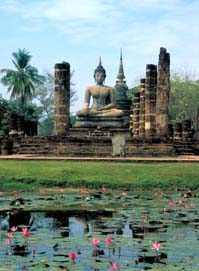| |
|
 |
What does Buddhism teach about ecology?
 |
 |
 |
The Buddha gazes over a lotus pond in Thailand |
All beings are connected
Buddhism teaches that the idea of separateness is an illusion. The health of the whole is inseparably linked to the health of the parts, and the health of the parts is inseparably linked to the health of the whole. This means that caring for the environment begins with caring for oneself: ‘When our hearts are good, the sky will be good to us,’ says Venerable Maha Ghosananda of Cambodia, a founding patron of ARC.
Respect for life
Buddhist practice makes one feel one’s existence is no more important than anyone else’s. If one treats nature as a friend and teacher, one can be in harmony with other creatures and appreciate the interconnectedness of all that lives.
Simplicity and moderation
Buddha taught people to live simply and appreciate the natural cycle of life. Craving and greed only bring unhappiness, since demands for material possessions can never be satisfied and people will always demand more, so threatening the environment. This is why the real solution to the environmental crisis begins with the individual.
Buddhists in Japan tell a story. The Buddha once received a donation of 500 new robes for his followers. So he considered what to do with the old ones. They would be used for bed-sheets, he decided. And the old sheets would become towels. And the old towels would be used as cleaning rags. Everything should be used and reused.
Right livelihood
According to Buddhism, the way you earn your livelihood – not killing, not stealing, not taking more than you need – all these are part of the Buddhist way of life. A livelihood that avoids harming others, such as trading in weapons, meat, alcohol or poisons – is in harmony with nature.
In April 2012 ARC Secretary General Martin Palmer delivered a paper on the challenges and opportunities facing contemporary Buddhism to the 3rd World Buddhist Forum in Hong Kong.You can read more about this event and the full text of his paper here.
Link here for a story about how the Tibetans stopped killing tigers for their skins almost overnight - after an appeal from the Dalai Lama in late 2005, who pointed out that killing endangered species is against the tenets of Buddhism.
Link here for a specially written leaflet about the Buddhist response to endangered pollinating species in the US.
|
 |
|
|
|
|
|
 |
Mongolian Buddhist Ecology
How ARC is supporting the revival of Buddhist ecology in Mongolia |
 |
Buddhist Faith Statement
A formal statement of Buddhist beliefs about creation and ecology: "The trees are like our mother and father, they feed us, nourish us, and provide us with everything" |
 |
April 25, 2012:
Making Buddhist teachings on protecting nature more relevant
"Sometimes we in the faiths strive too hard to make our teachings and traditions relevant to the modern world. In the case of Buddhism I don't think this is necessary. The core teachings of Buddhism about illusion, reality and the nature of compassion are eternal. They are truths we need to hear today as much as in the time of the historical Buddha" - Martin Palmer at the 3rd World Buddhist Forum, Hong Kong |
 |
 |
|
|

